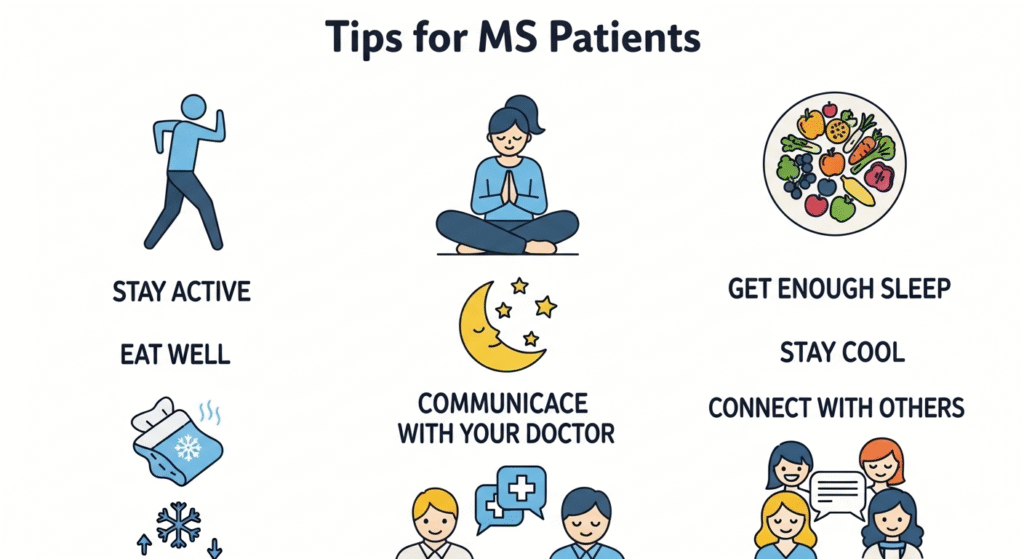Can Multiple Sclerosis Cause Hair Loss: If you are living with multiple sclerosis (MS) and noticing an increase in hair shedding, you're not alone. While MS itself does not directly cause hair loss, certain treatments and related factors can contribute to this concern. In this article, we explore the potential connections between MS and hair …
Can Multiple Sclerosis Cause Hair Loss: If you are living with multiple sclerosis (MS) and noticing an increase in hair shedding, you’re not alone. While MS itself does not directly cause hair loss, certain treatments and related factors can contribute to this concern.
In this article, we explore the potential connections between MS and hair loss, providing insights into possible causes, management strategies, and expert advice to help you navigate this challenge. By the end, you’ll gain a clearer understanding of how MS treatments may affect your hair and the steps you can take to manage it.

What Is Multiple Sclerosis and How Does It Affect the Body?
Multiple sclerosis (MS) is an autoimmune disease that affects the central nervous system (CNS), leading to the damage of the protective covering of nerve fibers, known as myelin. This disrupts communication between the brain and the rest of the body, leading to a variety of symptoms, including fatigue, muscle weakness, and vision problems.
- Symptoms: These can include blurred vision, difficulty walking, numbness, and cognitive changes. Each person with MS experiences a unique set of symptoms, and they can vary in severity.
- Treatment Options: Disease-modifying therapies (DMTs) are commonly used to reduce the frequency of relapses and slow disease progression. However, MS treatments can have various side effects, one of which may include hair thinning or loss.
Does MS Directly Cause Hair Loss?
While multiple sclerosis itself doesn’t directly cause hair loss, certain factors associated with the disease can contribute to hair thinning. It is important to differentiate between the effects of MS and the side effects of MS treatments.
- Stress and Anxiety: Coping with MS flare-ups can lead to significant stress and emotional strain. Stress is a well-known trigger for a condition called telogen effluvium, which can lead to temporary hair shedding. This condition is usually reversible once the stressor is removed.
- Nutritional Deficiencies: MS can impact a person’s ability to absorb nutrients properly, which may contribute to hair thinning. Inadequate levels of vitamins and minerals, such as iron and zinc, can play a role in hair health.
Medications Linked to Hair Loss in MS Patients

Some MS medications are associated with side effects that include hair loss or thinning. While these treatments help manage the disease, they can cause temporary or permanent hair changes. Here are some common medications linked to hair loss:
- Teriflunomide (Aubagio): This medication, used to treat MS, has been reported to cause hair thinning in approximately 10–14% of users. This is usually a temporary side effect.
- Cladribine (Mavenclad): Cladribine works by suppressing the immune system, which can sometimes lead to hair loss due to its immunosuppressive properties.
- Interferon Therapies: These treatments, often used for relapsing forms of MS, have also been known to cause hair thinning in some patients.
- Dimethyl Fumarate and Ocrelizumab: Other DMTs like these can also be linked to temporary hair thinning.
If you’re concerned about hair loss related to your medication, consult with your healthcare provider to discuss possible alternatives or solutions.
Understanding Telogen Effluvium: A Common Cause of Hair Thinning
Telogen effluvium is a condition in which hair enters the shedding phase prematurely due to stress, illness, or medication. This condition is common in MS patients, especially during periods of increased stress or disease flare-ups.
- Cause and Effect: When you experience stress or a significant life change, such as an MS relapse, your hair may enter the telogen phase (shedding phase) prematurely.
- Recovery: The good news is that hair loss from telogen effluvium is usually temporary. Once the stressor is removed or managed, hair typically begins to regrow within 3–6 months.
If you’re experiencing hair shedding, remember that this is often a sign that your body is under stress but not necessarily a permanent condition.
Can Multiple Sclerosis Cause Hair Loss: Tips for MS Patients

Managing hair loss can feel overwhelming, but there are several strategies you can implement to address this concern:
- Consult Healthcare Providers: Always talk to your healthcare provider about any side effects you’re experiencing from your MS treatment. They may suggest alternative medications or treatments that have fewer side effects related to hair loss.
- Ensure Proper Nutrition: A balanced diet rich in vitamins and minerals is essential for healthy hair. Consider consulting a nutritionist to ensure you’re getting the nutrients that support hair growth, such as biotin, vitamin D, and iron.
- Practice Stress Reduction: Managing stress through mindfulness practices, meditation, or yoga can reduce the impact of stress-induced hair loss. These activities not only benefit your mental health but may also promote better hair health.
- Gentle Hair Care: Avoid harsh treatments such as excessive brushing, tight hairstyles, or excessive heat styling, as these can worsen hair thinning. Use mild hair care products that nourish the scalp.
When to Seek Medical Advice
If you notice any of the following, it may be time to consult with a healthcare professional:
- Persistent Hair Loss: If hair loss continues for more than 6 months or doesn’t improve after addressing stress or medication changes, it’s a good idea to seek medical advice.
- Patchy Bald Spots: These may indicate another underlying condition, such as alopecia areata, which requires professional evaluation.
- Scalp Issues: If you experience redness, itching, or other scalp concerns, a dermatologist can help identify the cause and recommend appropriate treatments.
FAQs
Can MS cause permanent hair loss?
No, hair loss due to MS treatments is generally temporary, and hair tends to regrow after discontinuing the triggering treatment or managing stress.
Are there specific MS medications that cause hair loss?
Yes, medications like teriflunomide (Aubagio) and cladribine (Mavenclad) are linked to hair thinning in some patients.
How can I prevent hair loss while on MS medication?
Discuss with your doctor about changing medications or exploring alternative treatments that may not have hair loss as a side effect.
Is hair loss a common side effect of MS treatments?
It varies from patient to patient, but some MS treatments are known to cause temporary hair thinning.
When should I see a doctor about hair loss?
If your hair loss is sudden, severe, or doesn’t improve after managing stress or adjusting medications, it’s time to seek medical advice.
Conclusion:
While multiple sclerosis itself doesn’t directly cause hair loss, its treatments and related factors, such as stress and nutritional deficiencies, can contribute to hair thinning. By understanding the potential causes and taking proactive steps, you can manage hair loss effectively.
Consult with Dr. Uzma Irfan, an ISHRS-certified surgeon in Islamabad today, to explore personalized solutions and discuss treatment options that minimize side effects.






